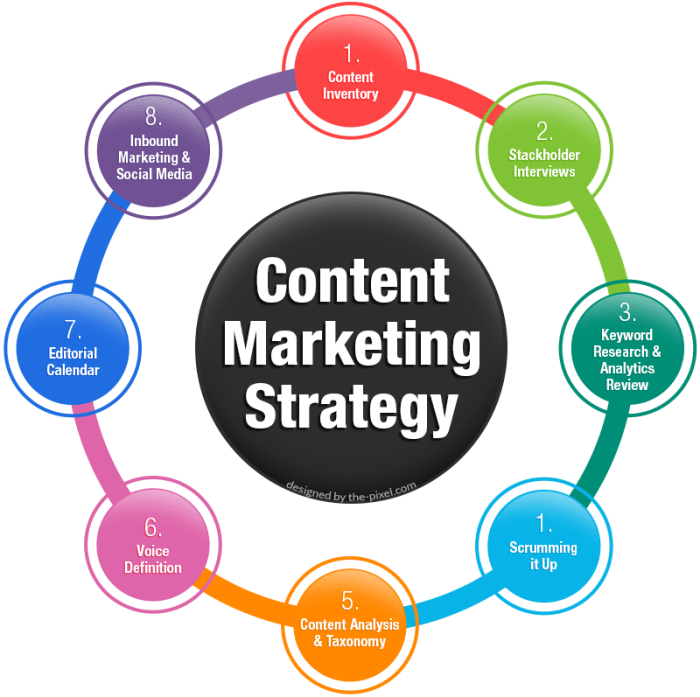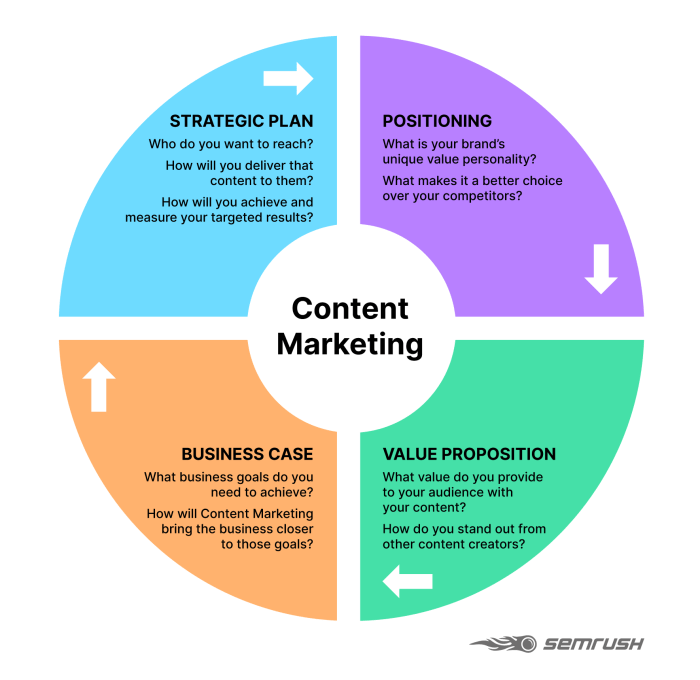Kicking off with Content Marketing Strategy, this opening paragraph is designed to captivate and engage the readers, setting the tone american high school hip style that unfolds with each word.
In today’s digital age, having a solid content marketing strategy is crucial for any business looking to stand out in a crowded online landscape. From defining target audience personas to incorporating storytelling, a well-thought-out strategy can make all the difference in attracting and retaining customers. Let’s dive into the key components and steps to create an effective content marketing strategy that drives success.
Overview of Content Marketing Strategy

Yo, let’s break it down for ya – a content marketing strategy is like the blueprint for how a business uses content to reach and engage its target audience. It’s all about creating valuable, relevant, and consistent content to attract and retain customers. From blog posts to social media updates, videos to podcasts, it’s the game plan that guides the creation, distribution, and promotion of content.
Havin’ a well-defined content marketing strategy is key, my friend. It helps businesses connect with their audience, build brand awareness, drive traffic, and ultimately boost sales. Without a solid strategy in place, you’re just throwing content out there and hopin’ for the best. But with a plan, you can be strategic about what you put out there and how you reach your peeps.
Examples of Successful Content Marketing Strategies
Check it – some brands are killin’ it with their content marketing game. Take a look at these examples:
- Red Bull: They ain’t just a drink – they’re a content powerhouse. From extreme sports events to adrenaline-pumping videos, Red Bull’s content keeps their audience engaged and comin’ back for more.
- GoPro: These action cameras are all about showin’ off epic adventures. GoPro’s user-generated content strategy showcases the amazing footage their customers capture, inspiring others to get in on the action.
- Dove: Known for their empowering campaigns, Dove’s content focuses on real beauty and self-confidence. Their thought-provoking videos and social media messages resonate with their audience on a deeper level.
Components of a Content Marketing Strategy
To create an effective content marketing strategy, there are key components that need to be considered. These components help in structuring and guiding the content creation process to reach the target audience effectively.
Defining Target Audience Personas
When defining target audience personas for a content marketing strategy, it is essential to conduct thorough research to understand the demographics, interests, behaviors, and pain points of the target audience. By creating detailed personas, marketers can tailor content that resonates with the specific needs and preferences of their audience.
- Research and gather data on target audience demographics such as age, gender, location, and income level.
- Identify the interests, hobbies, and preferences of the target audience to create relevant content that captures their attention.
- Understand the challenges, pain points, and motivations of the target audience to address their needs effectively through content.
- Create detailed personas with fictional characters representing different segments of the target audience to personalize content strategies.
Role of Storytelling
Storytelling plays a crucial role in a content marketing strategy as it helps in engaging the audience, building emotional connections, and conveying brand messages effectively.
Storytelling allows brands to create narratives that resonate with the audience on a deeper level, making the content more memorable and impactful.
- Use storytelling to communicate brand values, mission, and vision in a compelling and relatable way.
- Create narratives that evoke emotions, inspire action, and connect with the audience on a human level.
- Utilize different storytelling techniques such as testimonials, case studies, and user-generated content to add authenticity and credibility to the brand.
- Integrate storytelling across various content formats such as blogs, videos, social media posts, and podcasts to create a cohesive brand narrative.
Developing a Content Marketing Strategy
Creating an effective content marketing strategy is crucial for reaching your target audience and achieving your business goals. Here are the steps to develop a successful content marketing strategy:
Identify Your Goals and Target Audience, Content Marketing Strategy
- Define clear and measurable objectives for your content marketing efforts.
- Understand your target audience’s demographics, preferences, and behavior.
- Align your goals with the needs and interests of your audience.
Create High-Quality and Relevant Content
- Produce content that is valuable, engaging, and informative for your audience.
- Utilize various content formats such as blog posts, videos, infographics, and podcasts.
- Adapt your content to suit different stages of the buyer’s journey.
Implement Best Practices
- Optimize your content with relevant s to improve search engine visibility.
- Create meta tags, titles, and descriptions that are compelling and -rich.
- Build backlinks from reputable websites to increase your site’s authority.
Measuring Success in Content Marketing Strategy

In order to determine the effectiveness of a content marketing strategy, it is crucial to establish key performance indicators (KPIs) to track and measure success. These KPIs serve as benchmarks for evaluating the impact of the content and are essential for making data-driven decisions to optimize future marketing efforts.
Key Performance Indicators (KPIs)
- Website Traffic: Monitoring the number of visitors to your website can indicate the reach and engagement of your content.
- Conversion Rate: Tracking the percentage of visitors who take a desired action, such as making a purchase or signing up for a newsletter, shows the effectiveness of your content in driving conversions.
- Engagement Metrics: Analyzing metrics like time spent on page, bounce rate, and social media shares can provide insights into how audiences are interacting with your content.
Tools and Metrics for Tracking Success
- Google Analytics: This powerful tool allows you to track website traffic, user behavior, and conversions, providing valuable insights into the performance of your content.
- Social Media Analytics: Platforms like Facebook Insights, Twitter Analytics, and LinkedIn Analytics offer data on engagement, reach, and audience demographics to measure the impact of your content on social channels.
- Email Marketing Metrics: Tracking open rates, click-through rates, and conversion rates from email campaigns can help evaluate the effectiveness of your email content.
Importance of Data Analysis and Adjustments
Analyzing the data collected from KPIs and metrics is crucial for understanding what is working well and what areas need improvement in your content marketing strategy. By making informed adjustments based on performance data, you can optimize your content to better resonate with your target audience and achieve your marketing goals.